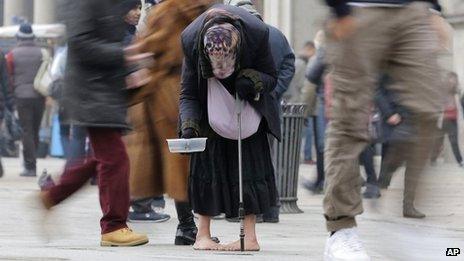Little sign of Europe's depression lifting
- Published

For several months European officials have been basking in the calm of the financial markets. They have fallen over themselves to declare the crisis over.
And then the news from the real economies intrudes. In the last quarter the European economies shrank at their fastest since 2009. In Italy, now in the final days of an election campaign, industrial output fell 6.7% last year.
Europe, at this time, would merit the attentions of the US Depression-era author John Steinbeck.
It is worth reading an article by Kostas Tsapogas, the former foreign editor of the Greek paper Eleftherotypia.
"to keep our dignity intact and avoid the depression that is enveloping the country."
He describes Athens shrouded in wood smoke as people strip the forests, unable to afford heating fuel.
"We are luckier," he writes, "than the people who are forced to live in their cars."
They apparently park at a different spot every few days hoping some stranger will offer them the use of a shower or a toilet.
And then lands in the email inbox.
It says that austerity measures are driving children across Europe into poverty, threatening to create "lost generations".
Three out of every 10 children in Greece, Ireland, Portugal, Italy and Spain, Caritas claims, have been pushed to the brink of poverty.
I meet an economist in Turin who speaks of a young generation abandoning Italy for the new world, for the US, Canada and Australia. In Spain they reckon 300,000 graduates have left the country.
'Disaffection and rage'
I spent the weekend attending political rallies in Italy. Pier Luigi Bersani, the man most likely to be the next prime minister, tells the story of Giuseppe Burgarella, an unemployed construction worker from Trapani in Sicily.
He tied a rope around his neck and hanged himself. He tucked a suicide note inside Article 1 of the Italian Constitution, which says that Italy is a republic founded on work. Why, he wanted to know, was the state not helping him find a job.
"We are worried because disaffection and rage are spreading fast across Italy," Mr Bersani said.
In a piazza in Turin I watched another candidate take the stage. He is Beppe Grillo, a comedian, a man who eschews the TV stations, relying instead on the internet and the power of the streets to spread his message.
Mr Grillo is the candidate of anger. He demands an end to the political caste running Italy; he promises to rid the political temple of the money-changers and the corrupt; he offers a referendum on the euro which he blames, in part, for ruining his country. He rages against the collapse of the economy and the ruin of people's lives.
He is denounced as a dangerous populist but he is filling the squares. He may well play an important role in this election, denying the established parties a stable majority and Italy a stable government.
Mr Grillo arrives at events by camper van. In the window he has stuck the word "Populista".
He wears the badge with pride. Mr Grillo wants to tear down the political establishment but is largely silent about what might follow. It is clear the other candidates fear his appeal.
The Italian voters may deliver victory to the candidate of the left, Mr Bersani. He may well form a coalition with the former Prime Minister, Mario Monti, who has fought a lacklustre campaign.
It is certainly the result favoured by European officials. What they want is a continuation of Mr Monti's reforms. But the mood in Italy is unpredictable.
The vote for Mr Grillo will be worth watching as a barometer of the frustration with not just Italy's political system but with what is happening to much of the European economy.
- Published8 February 2013
- Published24 September 2015